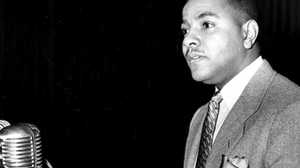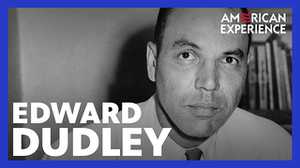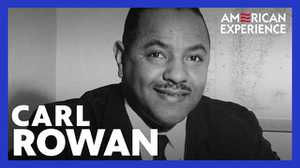Edward Dudley, Civil Rights Warrior at Home and Abroad
Meet the man who shaped the NAACP’s legal strategy with Thurgood Marshall.

Edward R. Dudley joined the legal staff of the National Association for the Advancement of Colored People in 1943. While the NAACP has a considerable legal staff today, only one other full-time lawyer comprised the staff in 1943: future Supreme Court Justice Thurgood Marshall. Far less known than his counterpart, Dudley served as the NAACP’s assistant special counsel and provided much needed support to Marshall over years and a series of landmark cases. The duo often coordinated with civil rights lawyers in other states to help them file NAACP lawsuits. Through Dudley and Marshall’s leadership this cadre of lawyers, though small in number, would leave an indelible mark on the civil rights movement.
During the 1940s, education was a centerpiece of the NAACP’s constitutional litigation. Dudley and Marshall’s strategy did not begin with a frontal attack on Jim Crow’s “separate but equal” constitutional standard. Rather, their legal teams led an incrementalist attack that operated within the “separate but equal” standard. The NAACP’s goal was to make segregation too expensive to maintain, recognizing that if courts actually required states to equalize their segregated institutions, the high financial costs of equalization would eventually put an end to segregated education.
Dudley and Marshall filed lawsuits throughout the South seeking to equalize public school teachers’ salaries. Segregated public school systems often paid white teachers more than Black teachers solely because of race. The NAACP only sought salary equalization, not full teacher desegregation, and so judges could increase Black teachers’ salaries without taking the more dramatic step of formally overturning the “separate but equal” standard.
Dudley filed lawsuits seeking to equalize Black teachers’ salaries in southern cities like Little Rock, Ark., Atlanta, Ga., Charleston, S.C. and Columbia, S.C. , winning wide personal acclaim. When Marshall was unable to attend trial in Duvall v. School Board, the Charleston case, Dudley capably stepped in. The Baltimore Afro-American published a story celebrating his courtroom performance. According to one trial observer, Dudley “showed up the defense lawyers and the board of education heads, toying with them like a cat toys with a mouse.”
Jim Crow infected every area of American life, and the NAACP attacked Jim Crow in many different areas beyond education.
Dudley and Marshall also worked to secure Blacks’ voting rights. In 1944, the NAACP triumphed in Smith v. Allwright, a U.S. Supreme Court decision that struck down the white Democratic primary in Texas. All-white primaries emerged in the South during the late nineteenth century to maintain white control of elections. Since the Democratic Party dominated southern politics, the Democratic primary was the only real political battleground. Once a candidate secured the Democratic nomination, the candidate was all but guaranteed success in the general election. As Dudley remembered, “If you couldn’t be part of the Democratic primary vote, then you weren’t part of the vote.”
The Court in Smith declared that the state’s white primary violated the Fifteenth Amendment, because it prohibited Blacks from voting because of their race. However, segregationists did not relent despite the NAACP’s victory. Segregationists devised new strategies to retain all-white Democratic primaries while purportedly respecting the Fifteenth Amendment. One method involved striking out all state laws regarding primaries, thus attempting to remove any semblance of state control over primaries. Democratic leaders also established all-white private clubs and associations and conducted all-white, pre-primaries. The pre-primary winner would then participate in the Democratic primary with full backing of party leaders and club members. Far from eliminating racial discrimination in voting, as intended by Smith, these methods merely moved the discrimination further upstream. State and local officials were explicitly clear about the purpose of these strategies. Indeed, days after the Smith decision, South Carolina Governor Ollin Johnson declared to the state general assembly “white supremacy will be maintained in our primaries.”
Faced with such disobedience, Dudley and Marshall charged back into federal courts. The NAACP would subsequently win Elmore v. Rice, invalidating South Carolina’s all-white, pre-primaries.

Outside of the courtroom, Dudley pursued racial justice in other ways. In the wake of World War II, the NAACP participated in the founding meetings of the United Nations. U.N. delegates from around the world sought to create a robust international legal framework that included rights recognized under the U.S. Constitution as well as rights not expressly protected by the U.S. This emerging framework sought to ensure social and economic rights for those who were “ill-fed, ill-housed, ill-clothed …and without the many benefits of a good life.” This was a powerful human rights framework, not a narrower civil rights framework.
Dudley and the NAACP appreciated the great promise of human rights. At the same time, they were clear about the limitations of pursuing racial justice using international law. The U.N. lacked both jurisdiction in the U.S. and the capacity to intervene in domestic affairs. Dudley asserted that if the U.N. were to be effective, it must have the legal “machinery to correct the abuses once discovered.” Human rights bodies without enforcement power would not end human rights abuses in the U.S. or elsewhere. At most, the U.N. could provide people of color a forum for “world publicity [that would] force some measure of redress by the offending state.” Dudley underscored, “This it would appear is the maximum we can hope to get at the present time.” Dudley’s assessment would unfortunately prove true for many people of color, including U.S. lawyers and activists seeking to end human rights abuses at home. Nonetheless, Dudley’s advocacy at the U.N. foreshadowed future developments. It was a beginning act in his career in global diplomacy.
In 1945, the NAACP granted Dudley a leave of absence to serve as counsel to the governor of the Virgin Islands. One of the governors Dudley served was William Hastie, the first African American appointed governor of a U.S. territory, NAACP co-counsel in the Smith case and a future federal judge. After nearly two years of service in the Virgin Islands, Dudley returned to the mainland and the NAACP’s legal staff.
In 1947, the NAACP represented John Wrighten, a Black student denied admission to the University of South Carolina Law School because of his race. The state of South Carolina, shortly before the trial, hastily opened a small law school at the Colored Normal, Industrial, Agricultural and Mechanical College of South Carolina (later South Carolina State University) to comply with the “separate but equal” constitutional standard. Dudley and Marshall battled the state’s lawyers in court, seeking to provide the new, all-Black law school with equal resources. .
The following year, the NAACP won the landmark case, Sipuel v. Board of Regents. Ada Sipuel applied to the University of Oklahoma, the state’s only law school, but the university denied Sipuel’s admission because she was Black. The U.S. Supreme Court declared that Oklahoma had violated Sipuel’s constitutional rights, because the state did not offer Sipuel an equal opportunity to receive a legal education. When the state created a segregated law school in the basement of the state capitol building, Dudley and Marshall stormed back into court to prove the inferiority of the segregated law school. The state relented, recognizing that it could not equalize its law schools, and the University of Oklahoma admitted Sipuel to its law school.
The NAACP’s efforts significantly expanded graduate and professional education at historically Black colleges and universities, and its litigation would help lay the foundation for desegregating all of higher education.
Less than a year after his return, however, Dudley resigned from the NAACP. In 1948, President Truman appointed Dudley to serve as U.S. envoy and minister to Liberia. Black newspapers highlighted that Dudley’s appointment made him “the top pa[id] of all of Uncle Sam’s colored personnel.” Dudley recalled that his NAACP ties and legal experience in the Virgin Islands opened the opportunity for his diplomatic post. Truman soon elevated the Mission in Liberia to a full U.S. Embassy, and in turn, Dudley was promoted as well. He became the first Black ambassador in U.S. history. Nonetheless, Dudley’s fight for justice at home and abroad was far from over. As journalists at that time also noted, “[T]he United States has sixty-five embassies and legations, only one of which is headed by a colored man.” It would be a fight that Dudley would continue to wage for years to continue.

H. Timothy Lovelace, Jr. is a legal historian of the civil rights movement. His work examines how the civil rights movement in the United States helped to shape international human rights law. Professor Lovelace joined the Duke Law faculty in June 2020 from Indiana University where he was a professor of law at the Maurer School of Law and affiliated faculty in the Department of History.








